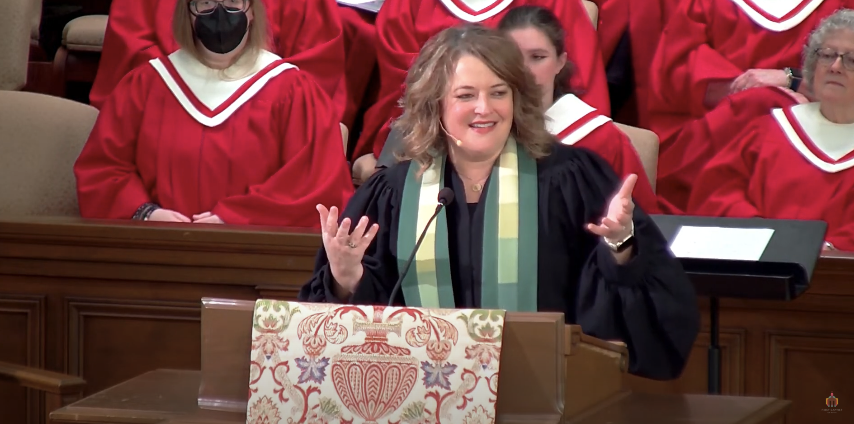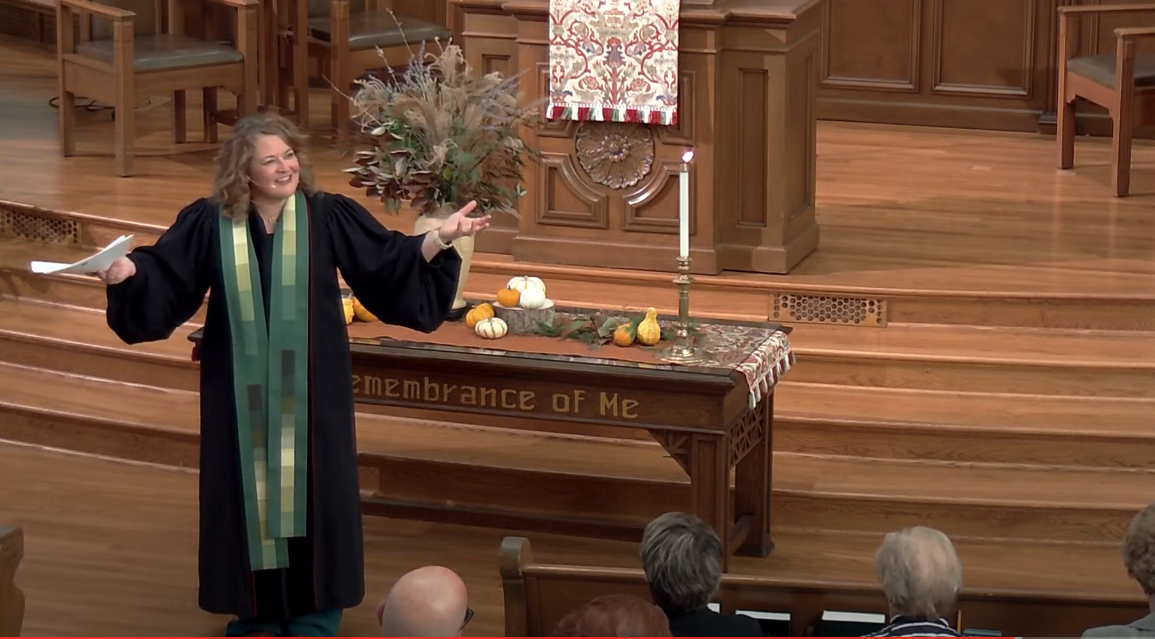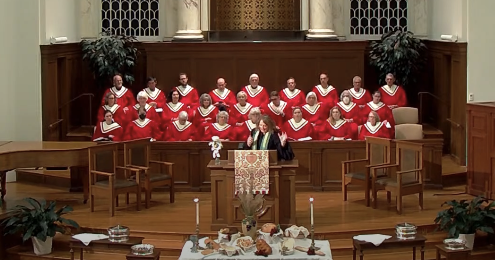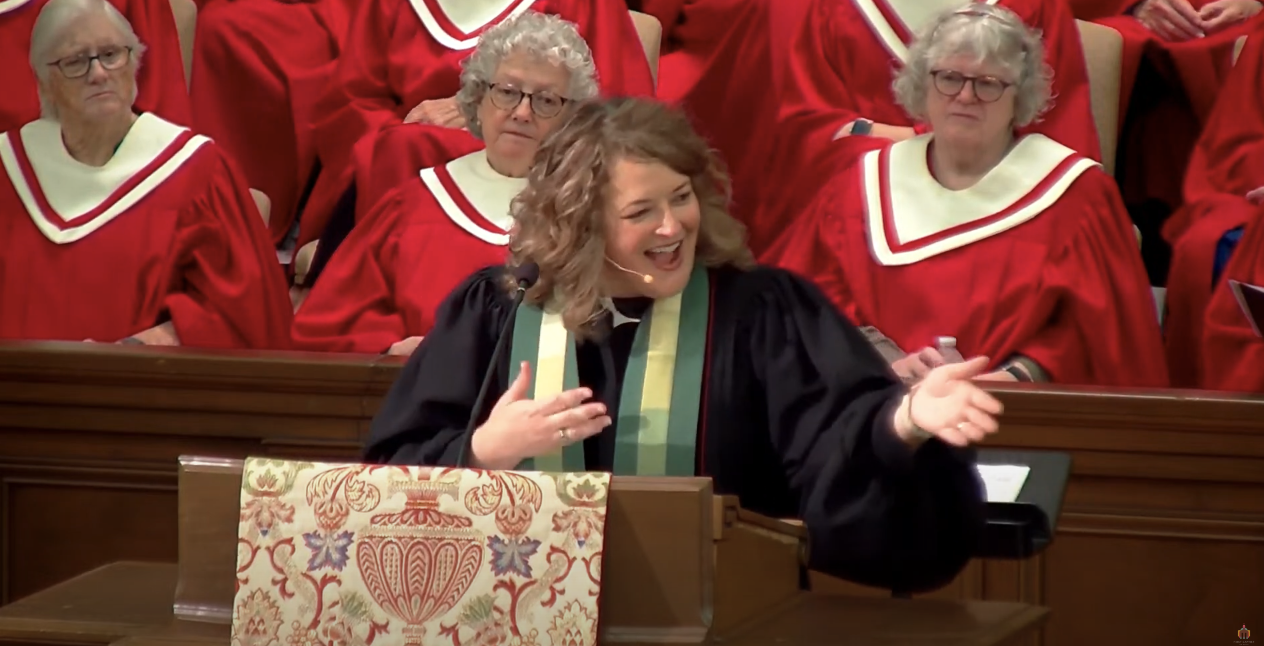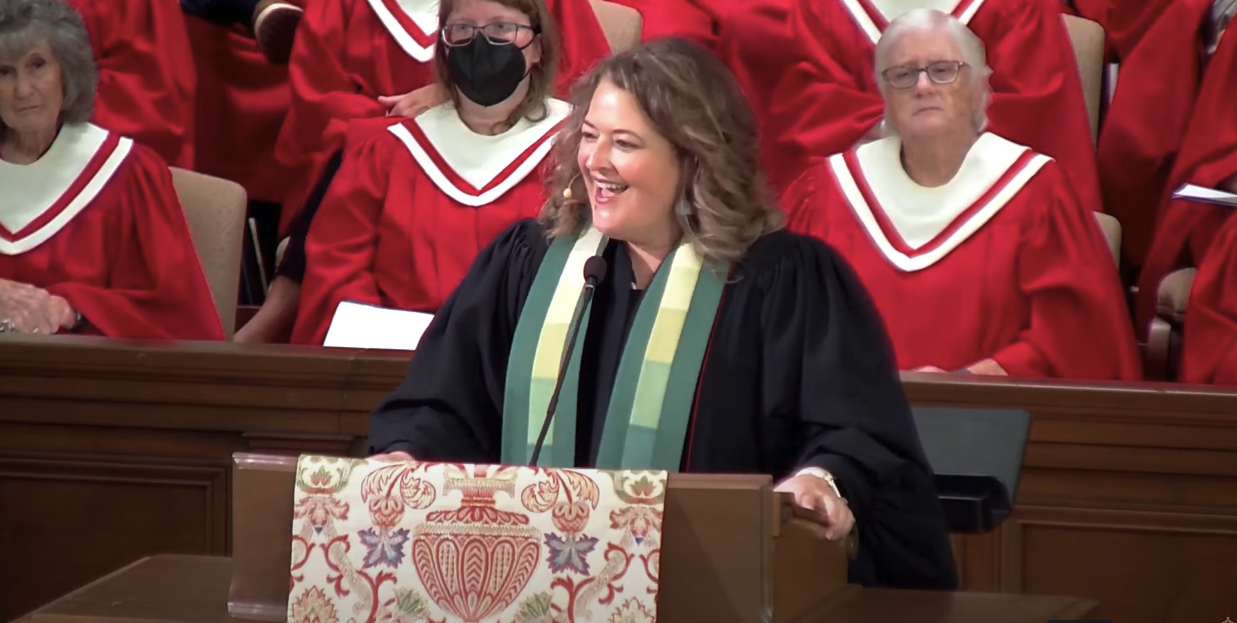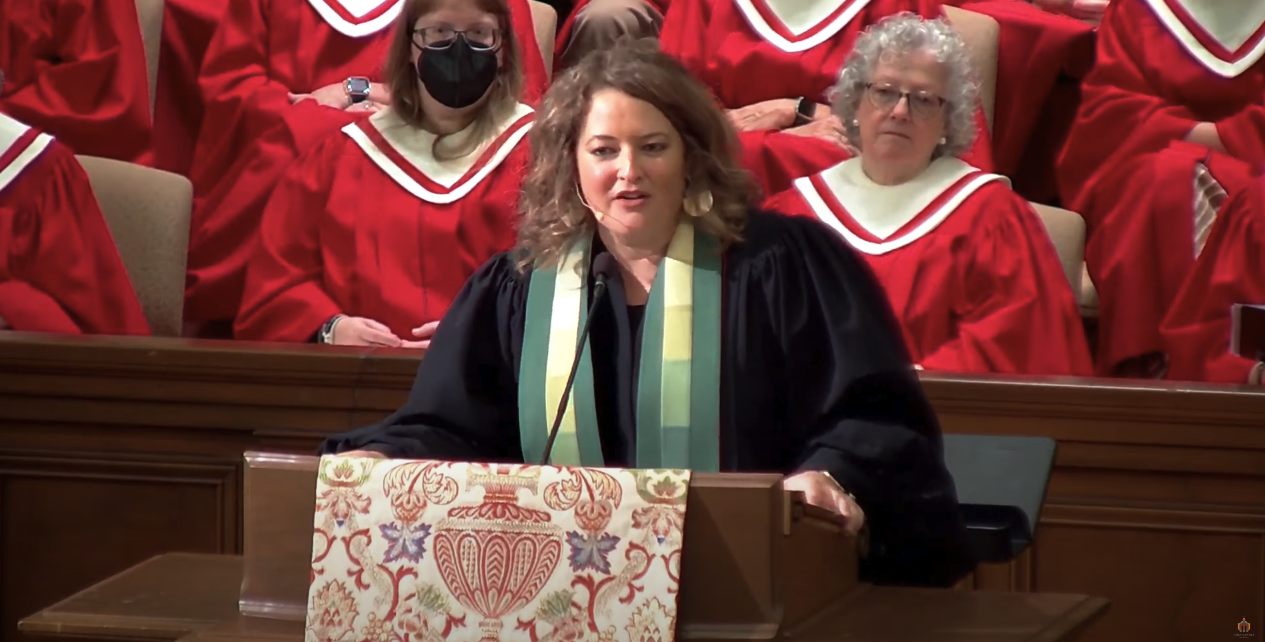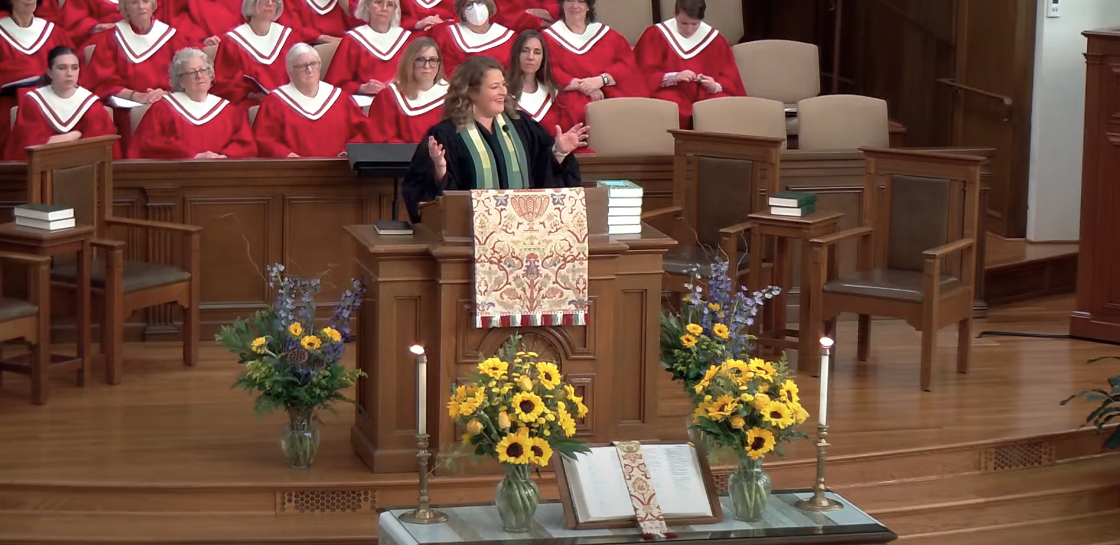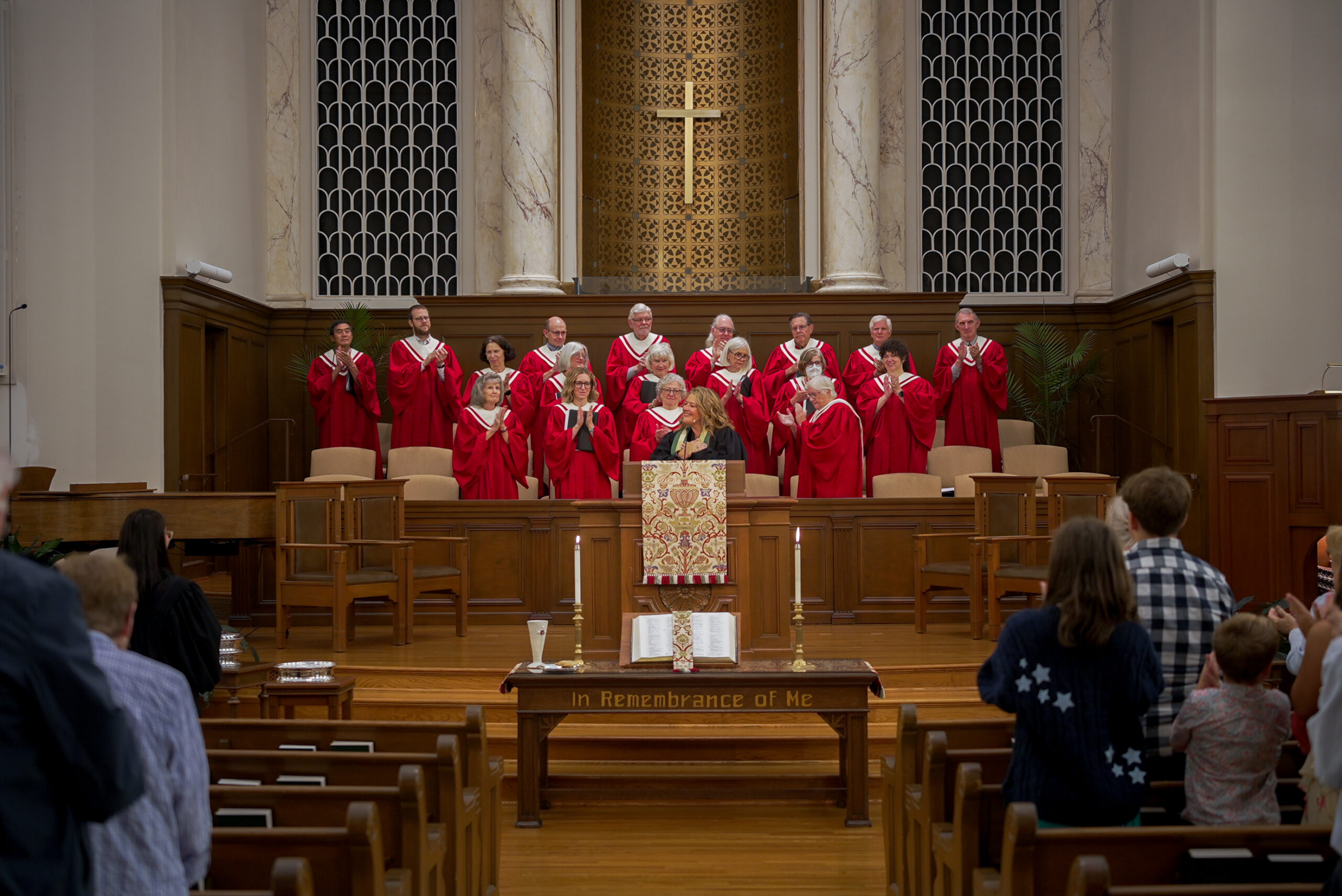I.Think with me for a minute of the groups of which you’ve been a part. Maybe a sports team, a company staff, a choir, a neighborhood association. Maybe a political party, a cluster of friends, a bowling league, a fan club. Maybe a country club or a college alumni association. No matter the type, ask yourselves: how do I show up? What drew me into this group? What keeps or kept me there? Why does it matter?
Now think with me about the church – could be our church, could be another church you’ve been part of, could be the capital-C church in general. Ask yourself, how do I show up? What drew me into this group? What keeps or kept me there? Why does it matter?
We’ve been talking this fall about what the church is for, and today, we’re considering that church is for life together. So how does church relate to other groups you’ve joined? Methodist pastor Will Willimon who laughed, saying, “When you join Rotary, they give you a handshake and a lapel pin. When you join the church, we throw you in the water and half drown you. Ponder that.” What makes the church different?
One answer might be in the thing that connects us all, right? We’re here, at least in part, because we want to follow Jesus. Some of us may have been doing that for a very long time, and others of us are doubtful but curious. And somewhere along the way, we’ve heard that the church has a role in being the presence of God in the world.
But let’s be honest – the thought that the church bears unique witness to God in Christ can be, well, stressful! Churches are full of people, right, and people? Sometimes they can just be the worst. They do things I don’t like, and say things I don’t agree with, and believe in things I don’t allow. They read books by authors I can’t stand, and vote for candidates I don’t prefer, and … did you see that Facebook post?! Sometimes churches can be like the one whose preacher said to her friend, “we have just had the greatest revival our church has experienced in many years!” “Wow!,” her friend responded, “how many new members joined your church?” “None,” said the preacher. “We lost five hundred.” You might say that churches full of people aren’t always full of warm fuzzies. Churches are full of those people who bother me, but churches are full of people like me, right?
This isn’t just a phenomenon in one local church, right? It happens all over! And, bless us, particularly among Baptists, that’s for sure! Literally at the core of our interpretation of the Christian life is that of dissent and freedom. So for Christians to pursue something that obligates us to each other, to use Walter Bruggemann’s language? Some of us might say no thanks! Because to say that all who follow Jesus are members of the body of Christ means that we may not like some other members! Pick your offense – Christians with cringy website graphics and questionable mission tactics? Members together! Churches with all the hierarchy or none of the hierarchy? Members together! Churches of all denominational traditions who perpetuate white supremacy and patriarchy, who cover up sexual abuse and promote Christian nationalism, and then the rest of us? Members! Churches in Israel and in Gaza, in Ukraine and in Russia, red churches and blue churches and purple churches all around our country, our city, and right here? Members! Together.
Membership in the body of Christ means all of us, all at once. We don’t get to choose an arm over a leg, or an eye instead of an ear. We can’t hand-select limbs or leave out appendages. We wouldn’t opt for a stomach one day and a heart another… and a liver every other Thursday! Honestly, it’s so much harder to be together in one body than it would be if we just went our separate ways. So why might Paul have insisted on this model instead?
II.“Now you are the body of Christ,” Paul says to the church at Corinth, “and individually members of it.” Paul the apostle shares a number of different metaphors for the church throughout his writings: the church as building, as temple, as field. But when there are problems with unity, when the churches he works with have interpersonal challenges to address, it is to this image of the body that Paul returns. And notice here that he does so, reminding the hearers that they already are the body of Christ. This has already happened in their baptism. He’s not telling them they should be like parts in a body, but that they already are the body… with the not-so-subtle subtext: so act like it! Expect difference, don’t just tolerate it! Cherish all that adds to the vibrant color of a community, because you can’t function without it! Like Dietrich Bonhoeffer says of Christian community in his book, Life Together, “Christian community is not an ideal we have to realize, but rather a reality created by God in Christ in which we may participate.” God has already done the creating in all our rich diversity, so let’s act like it!
Paul continues, giving particular examples. “Are all apostles? Are all prophets?” One scholar notes that a more accurate translation of the Greek would be, “Not all are apostles or prophets or teachers, are they?,” which underscores his acknowledgement that within the church, within the body of Christ that is already established, is difference.
What else do we know about the church from this text? In the midst of difference, what is the same, no matter their part, no matter their gift, no matter their role? A close reading reveals themes of belonging, arrangement, need, respect, capacity, disagreement, suffering, gifts. In all our difference, there is overlap – and that overlap is right at the heart of life together.
III.We’ve claimed some things over these fall weeks: the church is for accessibility, for hospitality, for sustainability, for legacy. All along the way, we’ve talked about different pieces of our building project that will help us commit more fully and live more deeply into those priorities. But at the heart of the experience of being a church for something is the question of how: how we are the church for these various priorities, how we are the church for something other than ourselves. As we draw this capital campaign to its close, we wonder today: how can the church move its body such that we choose life together?
We do so by practicing diversity. One scholar says, “For Paul, diversity within the Body of Christ is not just a nice ideal toward which the congregation can aspire. Rather, it is an essential component to the full functioning of that body.” In the body of Christ, everybody is somebody. Everyone counts. No one is left behind. All throughout this passage, we hear that God chooses variety. “God chooses, God combines, God arranges the parts in the body, just as God wanted them to be.” We don’t have to choose that diversity, because God has already chosen it and made it holy. Our role, then, is to celebrate all the elbows and the ears, the knees and the nose, the legs and the livers, even – especially! – when we think sometimes that just a church full of hands would make things a whole lot easier. Life is at its richest together in our difference. It re-members what has been dismembered.
How do we choose life together? By practicing obligation. Particularly here in the United States, we are conditioned into individualism, told the lie each day in this country that if only one at a time, we lifted ourselves up by our bootstraps, worked hard each day by ourselves, then we’ll really succeed. Tragedies lay this lie bare, as we’ve seen this month to use but one example. What would hurricane relief be without obligation? Each image of new bridges constructed together, water rescue of one stranger to another, mounds of supplies given sacrificially by some to be used gratefully by others – every bit of this counteracts that lie that we’re in it alone. And there is no better place to practice living into this different story of obligation than in the church! Of the church, as Walter Brueggemann said after the pandemic, “the time is well over in our society when it could be assumed that the church is simply ‘there’ and can be counted on at our convenience. Now we know how fragile the church as a community is, and that it therefore takes attentiveness on the part of all its members. …“I think membership obligates us to each other.”
A mother at church once told her pastor that one recent Sunday, after the pastor had invited people to share the peace of Christ with each other, her young son turned to her and asked, “what am I supposed to do with a ‘piece [P-I-E-C-E] of Christ?” You are the body of Christ, and individually pieces – parts – members of it. The pieces that together, bound up with each other, give glimpses of Word made flesh.
Finally, how do we choose life together? By practicing hope. We have only to look at the first Christian communities in the book of Acts to see that hope in action. “Awe came upon everyone,” Acts says of that first group of Christians, “All who believed were together and had all things in common; they would sell their possessions and goods and distribute the proceeds to all, as any had need. Day by day, as they spent much time together in the temple, they broke bread at home and ate their food with glad and generous hearts, praising God and having the goodwill of all the people.” Can’t do all of this without hope, right? Sam Wells said it best: “Community generates hope, because those committed to one another generate momentum and expectation of what God has in store; and hope generates community, since there is nothing more infectious than seeing beautiful things happen over and over again.”
IV.Let me tell you: practicing diversity, obligation, and hope can change a community. I’ll not soon forget the story that emerged from our last building project back in 2018-2019. We had made the hard decision to tear down two of our buildings, and proposed to the church what we thought would be a $6M “all the cards on the table”-sort of project. Imagine our surprise when that $6M more than doubled to $13.2M when the final numbers were in. We didn’t have $13M, and even if we did, should we spend that kind of money on a project like this? Certainly the lessons of more building than we can afford were fresh on our mind.
So of course this group of trusted leaders started cutting. Gone was the beautiful atrium gathering space and the freshly-renovated interior. Gone was the new landscaping, the paved parking, the fully-restored exterior. We cut and cut and cut, trying to preserve only what was absolutely necessary to get us into one building – heated and cooled, water and power, a roof and a way. When we considered again the idea of adding a handicapped ramp to the building – part of that original design – our Special Committee asked the same question of it, “is it necessary?” I remember one member worried faithfully about our mounting costs, how this would hamper our church’s budget over years, and wondered if this piece could wait “because we have an elevator,” they reminded us. Another member put her foot firmly and faithfully on the ground. “If we say we’re a church for all people, then we must be a church for all people. Even if we have an elevator. Because what would we do when it breaks?” Diversity. Obligation. Hope. They add up to life together.
V.This story sounds a bit to me like that old story of two brothers – one unmarried, one married with five kids. They had inherited the family farm, and each year, harvested all the grain it produced – half to one brother, half to the other. This arrangement worked well until one night, the married brother began to wake up at night, his mind swirling with worry. “This isn’t fair,” he’d think to himself, “my brother isn’t married. He’s all alone, and he only gets half the produce from the farm. Here I am with a wife and five kids, so I have all the security I need for my old age. But who will care for my brother in his last days? He needs to save much more for the future than he does at the present, so his need is obviously greater than mine.”
With that, he’d get out of bed, slip over to his brother’s place, and pour a sackful of grain in his brother’s granary.
The bachelor brother, too, had been having these bouts of anxiety that woke him up at night. “This isn’t fair,” he’d think to himself, “my brother has a wife and five kids, and he only gets half the produce from the farm. Here I am with only myself to support. Is it just that my poor brother, whose need is obviously greater than mine, should receive exactly the same as I do?”
With that, he’d get out of bed, slip over to his brother’s place, and pour a sackful of grain in his brother’s granary.
As it happens, one night, both brothers got out of bed at the same time and ran into each other crossing the farm, each with a sack of grain on his back. Many years later after their death, this story leaked out to the fellow townspeople who knew them well. And when it was time for the town to build a church, they chose the spot at which the two brothers met, for they could not think of any place in town holier than that one.
VI.The church is for life together, friends. In the diversity among us, the obligation between us, and the hope before us, we catch but a glimpse of God, right here, right now. In just a few moments, we’ll be turning in our commitment cards for the Life Together capital campaign and building project. Some of you, like me, have already made your commitment to this work. Some of you have cards ready to turn in today. If you haven’t yet considered offering a commitment of your financial resources to make this shared imagination come to life and feel called to do so, I’m asking you to do so today. On the left edge of each pew, there are capital campaign folders with pledge cards in them or just the cards themselves. Now and throughout our closing hymn, if you need one, just nudge your neighbor down the pew and ask them to pass it down. There should be plenty in the room, so if you need to look in front of or behind you, please do so. We will place our commitment cards in the offering plate in just a moment when it is collected, or you can hand them to a minister as you leave today.
May this act of commitment be an act of diversity, an act of obligation, an act of hope, an act of life together! Amen!


